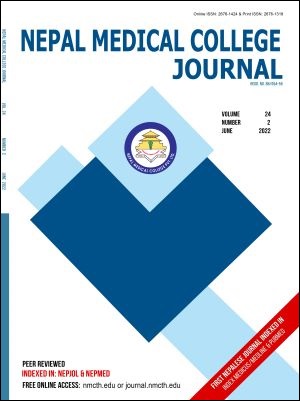Cardiovascular reactivity to stress shows proneness to future blood pressure status in students of a teaching hospital in Nepal
DOI:
https://doi.org/10.3126/nmcj.v24i2.46018Keywords:
Cardiovascular, blood pressure, hand grip, isometric, stressAbstract
Stress is a condition that disrupts or threatens to disrupt homeostasis. Stress may be physical or mental. Physical stress includes exercise (isometric or isotonic), pain, temperature (too hot or cold) etc. The development of hypertension is usually preceded by a prehypertensive state that may be manifested by abnormal cardiovascular reactivity to different types of stress viz., mental stress, cold water immersion, isotonic exercise, isometric handgrip, and valsalva maneuver. In present study, we have used isometric handgrip (IHG) exercise, as a stressor, aiming to identify individuals at increased risk for developing hypertension at early life. Normotensive, non-smoker sedentary two hundred male subjects, one hundred each from normotensive and hypertensive families, of age group 18-25 years participated in the study as volunteers. The causal blood pressure and heart rate of the participants were recorded in the sitting position by using mercury sphygmomanometer and stethoscope. Then, the isometric handgrip (IHG) exercise demonstrated to each of them using handgrip dynamometer. Maximum voluntary contraction (MVC) was noted as maximum pressure (in Kg) sustained during three seconds of handgrip using a handgrip dynamometer. The participants were asked to sustain isometric handgrip at one third of MVC for one minute with the same instrument (handgrip dynamometer). Both blood pressure and heart rate were recorded immediately after 1 and 3 minutes following isometric handgrip (IHG) exercise. The data analyzed using t-test showed that diastolic blood pressure didn’t return and stabilized to pre-exercise level even after 3 minutes following exercise in volunteers who were mostly from hypertensive family. More number of volunteers with family history of hypertensive (24%) showed elevated diastolic blood pressure even after 3 minutes whereas a few of the volunteers (8%) with no family history of hypertension showed rise in DBP even after 3 minutes following isometric handgrip (IHG) exercise. This present study indicated that the individuals having family history of hypertension are prone to develop hypertension in their early life, therefore, must adopt the healthier life style like avoidance of alcohol, smoking, and practice yogic exercise.
Downloads
Downloads
Published
How to Cite
Issue
Section
License
Copyright (c) 2022 Nepal Medical College Journal

This work is licensed under a Creative Commons Attribution 4.0 International License.
This license enables reusers to distribute, remix, adapt, and build upon the material in any medium or format, so long as attribution is given to the creator. The license allows for commercial use.




